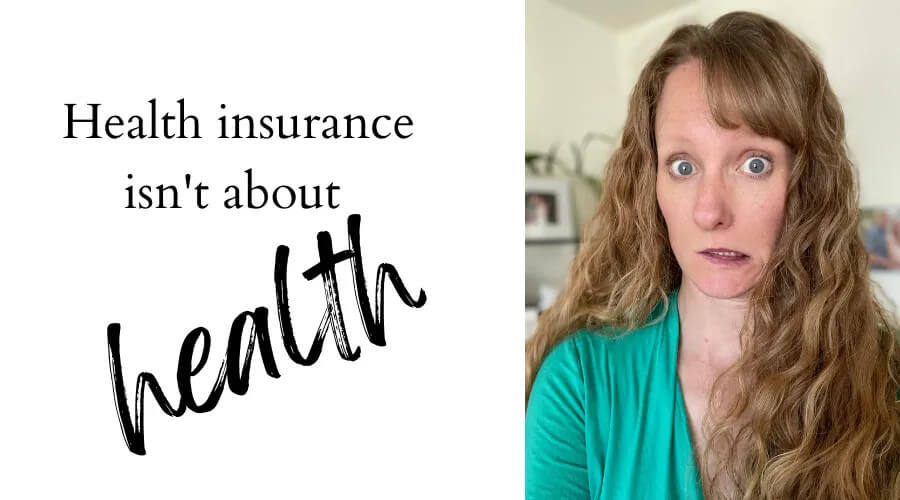
Can I use Health Insurance for Holistic Health?
I hate to break it to you, but your insurance company isn’t really all that interested in you being healthy. They’re looking to make as much money as possible and payout as little as possible.
Healthcare in America has continually gotten more expensive, yet the population isn’t getting healthier as a whole. Insurance deductibles have dramatically increased, prescription medication costs have skyrocketed, and insurance covers less than it ever did. And your copays are almost as much as the visit! Then factor in co-insurance for most services and you’re paying a fortune for minimal care.
Are your doctors really keeping you healthy, or just keeping you from dying? Healthcare in America does critical care (trauma and acute illness) very well – some of the best in the world. Conventional healthcare does NOT do well in the prevention of management of chronic diseases.
Couple all of this with the time constraints on your doctor – a 7-minute average doctor visit just doesn’t cut it. Patients lose.
So you look for something else, but what are the options? Let’s dig into the subject a little and assess
- What is your personal health vs disease philosophy?
- Who’s responsibility is it to take care of your body?
- What does medicine and healthcare look like in the future?
- What is insurance for?
DISCLAIMER! I am not opposed to conventional medicine or insurance. I think our medical doctors are the best-trained acute and emergency physicians in the world. There are some amazing and awesome docs out there! I am blessed to know quite a few. Most if not all of them got into medicine with the right intentions.
If you are having a heart attack, or get injured in a car accident, don’t call me to deal with the emergency. I am here to help you heal once the crisis has passed.
I think having a strong insurance policy to provide coverage for future healthcare needs or emergencies is great and is part of being a responsible adult. I am NOT here to debate who should pay for what– insurance companies or the government – because frankly, I don’t really want either entity dictating how my money is spent for my healthcare.
So let’s talk about healthcare as a philosophy…
What is your Personal Healthcare Philosophy?
Which of these fit your current train of thought?
- Doctors are 100% responsible for my health. I expect them to know what is happening in my body if I have symptoms and they should know how to treat it with pharmaceuticals to fix the problem.
- Doctors are 50% responsible for my health. They should know when to use a medication and when they should put the responsibility in my lap.
- I am 100% responsible for my health. My healthcare team should serve to educate me, provide resources for me to continue learning, and have knowledge as to whether a pharmaceutical answer or a lifestyle answer is best for me. They should also be able to point me in the direction of that lifestyle shift with specific recommendations. They should be supportive of and encouraging a holistic approach to health.
If you are in the first category, our conventional medical system is set up for you. You can go to your primary care physician and get your symptoms handled with prescriptions and surgeries, and worry no further.
I am not here to convince you that this is the wrong approach. Your insurance should cover what you’re looking for because you fit the profile. You wait to get an illness and the doctors will do their best to keep you comfortable.
If you are concerned about taking medications you would probably fit best in the second category. You would like to use prescription medications, if necessary, and are cautious but somewhat interested in alternative care. But, you are relying on your traditionally trained doctors to tell you what is best for you. Again, I am not here to convince you that this is wrong.
Just one question though… if your conventionally trained doctor has never had a class in nutrition, exercise physiology, stress management, or any other lifestyle strategy, how would they know to offer you anything other than prescriptions and surgeries? That is what they study.
Are medical doctors trained in nutrition?
Only about 25% of medical schools offer any training in nutrition today.
Yet, 90% of the healthcare crisis is due to lifestyle choices.
- Over 70% of Americans are overweight or obese
- Type 2 Diabetes, obesity, heart disease, stroke and high blood pressure are driven by lifestyle
- 90% of our country’s healthcare costs annually as a nation are spent to chronic disease management
So let me say that again…only 25% of medical schools offer any training in nutrition and lifestyle, but 90% of the healthcare costs are due to lifestyle diseases. Our conventional medical doctors are clearly NOT trained to handle this situation.
Let’s get back to insurance, then we will come back to the third category.
Should my insurance cover holistic healthcare?
Look at your auto, home or renters insurance. When does it pay? Does it pay for maintenance and prevention? Does it cover oil changes for your car? Furnace cleaning or new paint for your home? No! It pays when something goes wrong. After a crisis has occurred.
This is the same for health insurance. It pays after a crisis. Not for prevention or maintenance. If you neglect to change the oil in your car or paint your house and either start to fall apart, who’s responsibility is it?
So, when you have neglected your body for years, it’s skipping oil changes for years. Running your car on sludge doesn’t work any better than running your body on the Standard American. Your health insurance likely will help you out once the crisis has occurred, but what if you wanted to prevent the crisis from happening in the first place? Sorry, they won’t be much help!
What does my insurance pay for?
If you have a massive heart attack and need blood pressure meds or anti-diabetes drugs while you change your lifestyle, your insurance will pay.
But they will not pay for you to go to the gym, pay for functional tests to find nutrient deficiencies or food sensitivities, they will not pay for holistic practitioners who will teach you how to implement and maintain lifestyle changes. This is no different than expecting your auto insurance to pay for new tires.
Would it make sense for insurance to pay for these things? Absolutely!
Unfortunately, Big Insurance, Big Food and Big Pharma, along with our medical schools (which are paid for by Big Pharma, Big Insurance, and Big Food) have set up a system that has nothing to do with actual health and everything to do with sickness.
This system is set up to keep you from dying. This is not the same as living a vital, productive, happy life. They are not concerned with your quality of life on a daily basis. Until the end or when crisis strikes.
Does this apply to the entire medical system? No. Of course, you will find some great doctors who do have more holistic training and knowledge. However, under the insurance model, even they are hamstrung by what they are allowed to say and how long they can spend with you.
Insurance limits what’s possible. They restrict what doctors are able to say (the language they use), the diagnosis codes they can use, and the treatment options available. In fact, they can’t even offer a “treatment” unless there is a diagnosis. This means you have to already be sick before they can help! This is not helping you prevent illness. And it’s not helping you identify WHY you don’t have optimal health.
Holistic care—a new approach to health
The third category of health philosophy – I am 100% responsible for my health. My healthcare team should serve as educators and have the knowledge to assist in informing my decisions surrounding my health. This is holistic care. Mind, body, spirit via lifestyle and nutrition.
- We take a proactive approach. We do NOT neglect the maintenance. And if you have neglected maintenance in the past, we do our best to restore our body to normal function as much and as quickly as possible.
- You won’t just get 7 minutes with a holistic practitioner. We generally spend way more time with you. I generally start my clients with a 90 minute deep dive consultation – so you can be fully heard and understood, and I can fully understand the situation and your goals. From there, follow up sessions can range from 15 to 90 minutes as needed to continue the high level of care you need and deserve. A totally different model than insurance allows for.
But Holistic Care is Expensive!
Sure, it can be shocking to pay out of pocket for some tests, supplements, and holistic care. But let’s look a little deeper.
If you could spend $1000 to ultimately save $10,000 or more per YEAR for the rest of your life…would you do it? I bet you would!
On average, a person with type 2 Diabetes spends $16,752 on medical care. This medical care simply manages their illness…it doesn’t reverse it. These costs will only continue to increase throughout their lifetime.
Now, if you were able to identify the cause of your diabetes, change your lifestyle and diet – reverse your diabetes you wouldn’t need that medical care. You’d drastically cut your medical care costs…even though you paid out of pocket a fair sum of money.
Strategically spending money on functional testing, quality foods, quality supplements, lifestyle practices, and health technology can save you thousands (or more) over your lifetime. And you get to keep the skills you learn for life.
And, you may even be able to use your insurance to cover some. If not, you can often use Flexible Spending Accounts or Health Savings Accounts to save on your taxes.
And I’ll let you in on a little secret…paying directly is often cheaper (or no more expensive) than using insurance. Let’s look at an example. A comprehensive blood test through your insurance will cost $1500-$2000. Most insurance plans will cover 80% leaving you to pay $300-400. If you were to run the exact same testing without insurance it would cost $400.
I've had some clients take my list of blood chemistry markers to their doctor to have the test ordered through insurance...and it cost them over $2000 in copays because they were charged the full insurance rate for markers not covered. That same panel would have cost them a couple hundred dollars through me.
I get it – these things aren’t cheap. This is why working with a qualified professional can help keep the costs to a minimum. Strategically choosing the right functional testing or technology can help you get the most efficient answers possible so you can get to healing and living with vitality. This needs to be fully personalized to YOU – your current state, your goals, and your life. This shouldn’t be standard care.





















0 Comments